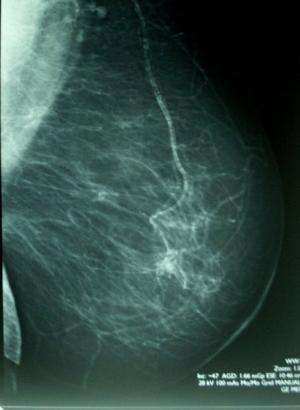The number of breast cancer surgery which a hospital performs yearly does not play a significant role in the chance of survival. This is the conclusion of research of Sabine Siesling from the University of Twente (MIRA institute) and the Comprehensive Cancer Centre (IKNL) which is published in Breast Cancer Research and Treatment. The study was performed together with the Vereniging Samenwerkende Algemene Ziekenhuizen and medical specialists and does not supports the attention given nowadays to the volume norms for treatment of breast cancer.
The researchers analysed data from the Netherlands Cancer Registry of almost 59,000 patients who had been surgically treated for breast cancer between 2001-2005. The aim was to investigate whether the volume of breast cancer surgery of the hospital was relate to the ten year survival.
No differences above 75 operations
The analyses revealed that hospitals with yearly between 75-99 operations,100-149, 150-199 and more than 200 operations have comparable results. In hospitals with less than 75 operations per year risk of death ten years after diagnosis and after case-mix correction was 9% higher. In the period under study (2001-2005) nineteen hospitals had less than 75 operations per year. Ten year survival of the patients was 77%. There were 30, 29, 9 and 14 hospitals with a volume of 75-99, 100-149, 150-199, and 200 or more procedures per year. Ten year survival of the patients treated in these hospitals were 81%, 80%, 82% and 82% respectively.
The number of hospitals with less than 75 breast cancer operations per year is decreased due to merges and collaboration between hospitals and the increase of newly diagnosed breast cancer patients. Meanwhile all hospitals in the Netherlands have more than 75 breast cancer operations.
Other factors have more influence
The study revealed that factors such as high age at time of diagnosis, a higher tumour stage, a larger tumour, a larger number of positive lymph nodes, a diagnosis long ago, and a lower socaial economic status, influenced durvival to a larger extent than surgical volume.
The study does not support the volume norm for breast cancer in the Netherlands and shows that volume can not be used as such to indicate the quality of breast cancer care. Other factors appeared to have more influence on breast cancer survival. Due to the development of molecular testing and new treatment modalities it is to be expected that care for patients with breast cancer will become more and more complex and more individualized approaches will be needed.
This demands for a multidisciplinary approach of the quality of care, which is done by the Netherlands Breast Cancer Audit (NBCA), in which all hospitals in the Netherlands participate at this moment.
Journal information: Breast Cancer Research and Treatment
Provided by University of Twente





















